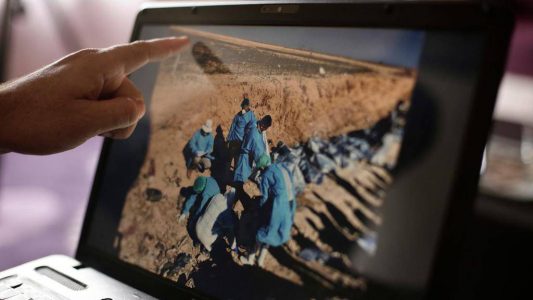
UN investigators release app to help bring the Islamic State terrorists to justice
Former Yazidi sex slaves and others who suffered under the brutal reign of ISIS will soon be able to upload evidence against their abusers through a mobile phone app, the head of the UN investigation team in Iraq said on Monday.
Karim Ahmad Khan told a video UN Security Council meeting that the app, which will come online this month, will allow ISIS victims to upload photographs and other proof of abuse to help put perpetrators behind bars.
Mr Khan is the head of the investigations team known as Unitad.
The app is a boon for ISIS victims, many of whom fled overseas during the extremist group’s onslaught and have struggled to testify against their abusers.
Victims’ groups say that too few ISIS militiamen have faced justice for their crimes.
“We’re rolling out a mobile application that allows Unitad to work and communicate directly with the survivor communities, whether they’re in Iraq, Australia or Germany,” Mr Khan said.
“They can actually give us their names and details securely. They can even update photographs and other material so that we can expedite our focused investigation to get results.”
The app was initially designed to gather evidence in Iraq under the coronavirus pandemic travel restrictions, Unitad said in its latest report.
But it became clear that it could ease communication with victims who had fled Iraq and lived overseas.
The app is not the first time UN investigators have turned to technology to build cases against ISIS militiamen, who swept across western Iraq from Syria in 2014 to expand their self-declared caliphate and brutalise minorities.
Mr Khan said “4K drones” had been sent to capture high-quality footage of mass graves and the sites of ISIS atrocities.
High-tech “3D laser scanners” on the ground could also help to build powerful cases.
“We can preserve crime scenes and represent them in 3D modelling so that, whether it’s in Baghdad or Bartella or Berlin, this evidence can be put before judges so they can understand what took place, how it took place, and it can bring life to the accounts of witnesses and courageous survivors,” Mr Khan said.
Iraqi prosecutors have provided UN detectives with about 2 million data trails from mobile phone communications in Sinjar from July and August 2014, when ISIS was rampaging through the Yazidi heartland, he said.
“That allows us to locate witnesses, who have given accounts to say where they were, and perpetrators, to see where suspects were, who they spoke to in different time periods,” Mr Khan said.
“We’ve used that technology with quite some success.”
War crimes investigators have also received mobile phones, hard drives, computers and other equipment confiscated from ISIS prisoners that can be “scrubbed for evidence” and used by prosecutors in Iraq and overseas.
Mr Khan said the approach was paying off.
Investigators have used digital evidence, exhumations of mass graves and witness testimonies to identify 344 ISIS abusers across 16 crime sites in the north-western Sinjar region.
They have also begun to broaden their search, including for non-Yazidi ISIS victims.
They include the Shabak, Kakai and Turkmen communities and Sunni Muslims.
Mr Khan urged Iraqi politicians to pass a law designed by President Barham Salih to allow courts to prosecute war crimes, which has been delayed in recent months during Iraq’s political turmoil, mass protest movement and the coronavirus outbreak.
Iraq’s UN ambassador, Mohammed Al Uloom, told the council that his country’s “wounds will heal only by revealing the perpetrators of these heinous crimes and by bringing them to justice”.
Iraqi forces were brushed aside as ISIS swept across the country in 2014, slaughtering thousands of members of the Yazidi minority community in Sinjar and forcing more than 7,000 women and girls into sexual slavery.
A US-led military coalition pushed the militants back and Iraq declared victory over ISIS in December 2017.
Iraqi officials have since prosecuted tens of thousands of detained former fighters, but Human Rights Watch and Yazidi activists say the trials are often flawed.
A UN report in January found that Iraqi judges relied too heavily on confessions from suspects, which are often obtained under torture.
Many suspects have been prosecuted for membership of ISIS, rather than for the specific atrocities they had committed.
Under pressure from human rights lawyer Amal Clooney and Yazidi survivors, the UN Security Council in 2017 created Unitad to help Iraq collect and preserve evidence for future prosecution.
Source: The National





